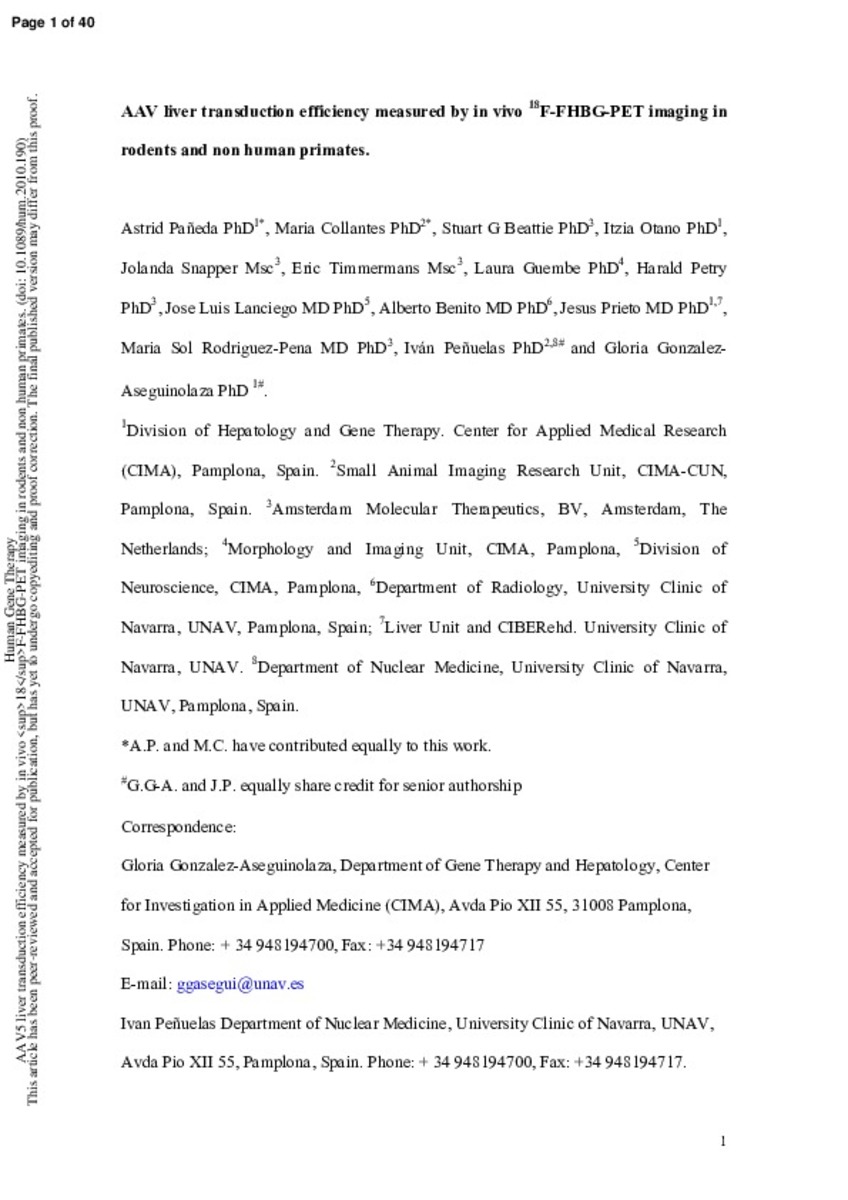Full metadata record
| DC Field | Value | Language |
|---|---|---|
| dc.creator | Pañeda, A. (Astrid) | |
| dc.creator | Collantes, M. (María) | |
| dc.creator | Beattie, S.G. (Stuart G.) | |
| dc.creator | Otano, I. (Itziar) | |
| dc.creator | Snapper, J. (Jolanda) | |
| dc.creator | Timmermans, E. (Eric) | |
| dc.creator | Guembe, L. (L.) | |
| dc.creator | Lanciego, J.L. (José Luis) | |
| dc.creator | Benito-Boilos, A. (Alberto) | |
| dc.creator | Prieto, J. (Jesús) | |
| dc.creator | Rodriguez-Pena, M.S. (María Sol) | |
| dc.creator | Peñuelas-Sanchez, I. (Ivan) | |
| dc.creator | González-Aseguinolaza, G. (Gloria) | |
| dc.date.accessioned | 2011-12-01T08:51:26Z | - |
| dc.date.available | 2011-12-01T08:51:26Z | - |
| dc.date.issued | 2011 | - |
| dc.identifier.citation | Pañeda A, Collantes M, Beattie SG, Otano I, Snapper J, Timmermans E, et al. Adeno-associated virus liver transduction efficiency measured by in vivo [18F]FHBG positron emission tomography imaging in rodents and nonhuman primates. Hum Gene Ther 2011 Aug;22(8):999-1009. | es_ES |
| dc.identifier.issn | 1557-7422 | - |
| dc.identifier.uri | https://hdl.handle.net/10171/20043 | - |
| dc.description.abstract | Recombinant adeno-associated virus 5 (rAAV5) represents a candidate vector with unique advantages for the treatment of hepatic disorders because of its narrow hepatic tropism. Noninvasive in vivo imaging of transgene expression provides an important tool with which to quantify the transduction efficiency, and duration and location, of transgene expression. In this study, we used positron emission tomography (PET) and positron emission tomography-computed tomography (PET-CT) imaging to monitor liver transduction efficacy in rodents and nonhuman primates that received rAAV5 vector encoding herpes simplex virus thymidine kinase (HSV-TK). HSV-TK expression in liver was also measured by immunohistochemistry. Notable differences in liver transduction efficiency were found, dependent on the animal species and sex. Male rodents were better transduced than females, as previously described. Moreover, male nonhuman primates also displayed increased hepatic expression of the rAAV5-delivered transgene, indicating that differences in rAAV-mediated liver transduction can be anticipated in humans. Our results demonstrate the high sensitivity and reproducibility of PET, using HSV-TK and [(18)F]FHBG, to detect gene expression after rAAV vector administration into living animals, confirming the utility of this technology in the quantification of transgene expression, even at low expression levels. However, we also describe how an immune response against HSV-TK hampered analysis of long-term expression in nonhuman primates. | es_ES |
| dc.language.iso | eng | es_ES |
| dc.publisher | Mary Ann Liebert | es_ES |
| dc.rights | info:eu-repo/semantics/openAccess | es_ES |
| dc.subject | AAV | es_ES |
| dc.subject | PET | es_ES |
| dc.subject | PET-CT | es_ES |
| dc.subject | FHBG | es_ES |
| dc.subject | Liver | es_ES |
| dc.subject | Non-invasive gene expression analysis | es_ES |
| dc.title | Adeno-associated virus liver transduction efficiency measured by in vivo [18F]FHBG positron emission tomography imaging in rodents and nonhuman primates | es_ES |
| dc.type | info:eu-repo/semantics/article | es_ES |
| dc.relation.publisherversion | http://www.liebertonline.com/doi/abs/10.1089/hum.2010.190 | es_ES |
Files in This Item:
Statistics and impact
Items in Dadun are protected by copyright, with all rights reserved, unless otherwise indicated.






